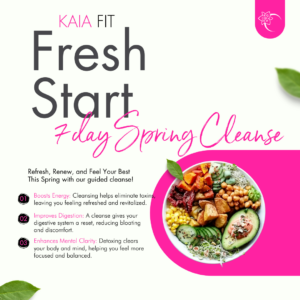Gut health is a hot topic in nutrition and wellness, and for good reason.
Your gut, often referred to as your “second brain,” plays a significant role in your overall well-being, impacting everything from digestion and immunity to mood and mental clarity.
For women, maintaining a healthy gut is particularly important, as hormonal fluctuations, stress, and lifestyle factors can all influence gut health. Let’s dive into why gut health matters and explore foods that promote a thriving gut microbiome.
Why gut health is crucial for women
The gut microbiome, a community of trillions of bacteria, fungi, and other microorganisms living in your digestive tract, plays a vital role in various bodily functions, including:
- Digestion and nutrient absorption: A healthy gut helps break down food efficiently and absorb nutrients essential for energy, skin health, and hormone balance.
- Immune system support: About 70% of your immune system resides in your gut, making a healthy microbiome crucial for fending off illness and maintaining a strong immune response.
- Hormonal balance: The gut and hormones are intricately linked. A healthy gut helps metabolize and balance hormones like estrogen, which is especially important during menstrual cycles, pregnancy, and menopause.
- Mood regulation: The gut produces neurotransmitters like serotonin, which can impact your mood and mental health. Poor gut health has been linked to anxiety, depression, and mood swings.
Signs of an unhealthy gut
Women may experience various symptoms indicating that their gut health is out of balance, such as:
- Digestive issues like bloating, gas, or constipation
- Fatigue and low energy levels
- Unexplained weight changes
- Skin issues like acne or eczema
- Brain fog or difficulty concentrating
- Frequent colds or infections
Addressing gut health through nutrition is one of the most effective ways to restore balance and improve these symptoms.
Best foods for gut health
To maintain a healthy gut microbiome, focus on incorporating foods that nourish beneficial bacteria while minimizing foods that can harm gut health (like highly processed, sugary, or inflammatory foods). Here are some gut-friendly foods for women:
1. Fiber-fich foods
Dietary fiber is essential for a healthy gut because it feeds beneficial bacteria and promotes healthy digestion. Fiber-rich foods also help regulate bowel movements, reducing the risk of constipation or bloating.
- Examples: Whole grains (quinoa, oats, brown rice), legumes (beans, lentils), fruits (apples, berries, pears), vegetables (broccoli, spinach, carrots), and nuts and seeds (chia seeds, flaxseeds).
2. Fermented foods
Fermented foods are a powerhouse for gut health because they contain probiotics—live bacteria that can help repopulate your gut with beneficial microbes. Regular consumption of probiotics may improve digestion, boost immunity, and even enhance mental well-being.
- Examples: Yogurt (with live active cultures), kefir, sauerkraut, kimchi, kombucha, miso, and tempeh.
3. Prebiotic foods
Prebiotics are types of fiber that feed the good bacteria in your gut, helping them grow and thrive. Think of prebiotics as fertilizer for your gut garden.
- Examples: Garlic, onions, leeks, asparagus, bananas, artichokes, and dandelion greens.
4. Polyphenol-rich foods
Polyphenols are plant compounds that have antioxidant and anti-inflammatory properties. They help protect gut bacteria and promote the growth of beneficial strains.
- Examples: Green tea, dark chocolate, berries, grapes, nuts, olive oil, and coffee (in moderation).
5. Bone broth
Bone broth is rich in collagen and gelatin, which may help repair and strengthen the gut lining. This is especially beneficial for women dealing with conditions like leaky gut syndrome, where the gut lining becomes more permeable and leads to digestive and immune issues.
- Examples: Homemade or high-quality store-bought bone broth made from simmering animal bones.
6. Ginger
Ginger is a natural anti-inflammatory that supports digestion and reduces bloating. It can stimulate stomach acid production and encourage the movement of food through the digestive tract, which is particularly helpful for women dealing with slow digestion.
- Examples: Fresh ginger root (grated into tea, smoothies, or meals), dried ginger powder, ginger tea.
7. Healthy fats
Healthy fats are important for gut health because they reduce inflammation and support the integrity of the gut lining. Omega-3 fatty acids, in particular, can enhance the diversity of gut bacteria.
- Examples: Fatty fish (salmon, sardines), avocados, flaxseeds, chia seeds, walnuts, and olive oil.
8. Zucchini and squash
As someone who loves zucchini, yellow squash, and spaghetti squash, you’ll be happy to know that these foods are great for gut health. They’re easy on the digestive system and provide fiber and water, both of which promote smooth digestion.
- Examples: Zucchini noodles, roasted yellow squash, spaghetti squash with healthy sauces.
Foods to limit for a healthy gut
To maintain a balanced gut microbiome, it’s also important to limit foods that can harm gut health. These include:
- Processed foods: High in sugar, unhealthy fats, and additives, processed foods can disrupt gut bacteria balance and increase inflammation.
- Refined sugars: Excess sugar feeds harmful bacteria and yeast in the gut, leading to imbalances and digestive discomfort.
- Artificial sweeteners: Some artificial sweeteners have been shown to negatively impact gut bacteria and may contribute to glucose intolerance.
Lifestyle tips to support gut health
In addition to focusing on gut-nourishing foods, here are a few lifestyle habits that can help promote a healthy microbiome:
- Manage stress: Chronic stress can harm the gut microbiome and exacerbate digestive issues. Incorporate relaxation techniques like meditation, yoga, or deep breathing exercises to manage stress effectively.
- Stay active: Regular physical activity has been shown to increase the diversity of gut bacteria and improve digestive function.
- Prioritize sleep: Poor sleep can disrupt gut health, leading to digestive issues and inflammation. Aim for 7–9 hours of quality sleep each night.
- Stay hydrated: Water is essential for digestion and nutrient absorption, so make sure you’re drinking enough to support healthy gut function.
- Limit antibiotics: While necessary in certain situations, antibiotics can disrupt your gut bacteria balance. If you must take antibiotics, consider incorporating probiotics and fermented foods to help restore your microbiome afterward.
In conclusion
Maintaining a healthy gut is one of the most impactful steps you can take to support your overall well-being as a woman.
By eating fiber-rich, prebiotic, and probiotic foods while limiting processed and sugary foods, you can promote a balanced and thriving gut microbiome.
Combine these dietary habits with stress management, regular exercise, and adequate hydration, and you’ll be well on your way to better digestion, improved immunity, and greater energy. Embrace your gut health journey—it’s the foundation of vitality and wellness!
Kaia FIT is a women’s fitness and nutrition program that empowers women to become the best version of themselves through personalized coaching in a group environment. We prioritize community to help connect women to each other for additional support and accountability. Caren Roblin is the owner of Kaia FIT Sierra, with four studio locations in Reno-Sparks.




